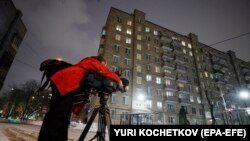On February 2, news reports said Germany’s media regulator rejected the Russian state-owned media outlet RT (formerly Russia Today) because it did not have an appropriate broadcast license.
The move upheld a decision in December, when RT DE began broadcasting in German on satellite and online based on the channel's Serbian license. German authorities said RT never attempted to get a German license.
In response to the rulings, Russia appealed to the Organization for Security and Cooperation in Europe (OSCE):
“We are seriously concerned about the decision of the German broadcasting regulator to ban transmission of RT DE,” the Russian Mission to OSCE’s Twitter account tweeted.
“We call on the @OSCE_RfoM to assess the situation around RT DE and to remind Berlin of necessity to fulfill its obligations on freedom of the media and access to information.”
That is misleading.
It is standard practice for governments to require media outlets to have a broadcast license. Serbia is not a member of the European Union. Germany, an EU member, said Serbia's license has no legal standing in the EU.
It's Orwellian to say the least for Moscow to complain about press freedom.
Russia is well-known for draconian media restrictions, threats to independent journalists and impunity when they are harmed. In the watchdog group Reporters Without Borders' global rankings of press freedom, Russia posts near the bottom: 150th out of 180 countries rated in 2021.
Russian authorities routinely censor foreign and domestic independent media, either forcing them to close by declaring them “undesirable organizations,” or saddling them with heavy restrictions and fines as “foreign agents.”
(Disclosure: The Voice of America and Radio Free Europe/Radio Liberty were both designated foreign agents in 2017. A dispute over the designation is ongoing.)
Almost immediately after German authorities reaffirmed RT’s lack of broadcasting rights, Russia’s Foreign Ministry announced it would retaliate by banning the German state news agency Deutsche Welle in Russia and stripping DW reporters of their accreditation to work there.
The latter step is more severe than Germany’s withdrawal of RT’s broadcasting rights.
RT chief editor Margarita Simonyan nonetheless vowed that her channel would continue broadcasting to Germany. Simonyan has previously described her network as akin to the Russian Defense Ministry, bragging that it was capable of “conducting information war against the whole Western world.”
The German license actions in December followed a decision by the U.S. video platform YouTube to suspend RT’s German channel for violating rules on publishing COVID-19 vaccine misinformation.
The United States also requires RT's parent nonprofit organization, TV-Novosti, to register as a foreign agent with the U.S. Justice Department, including amounts spent on programming.





